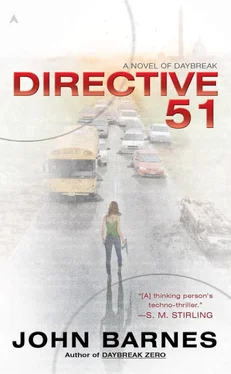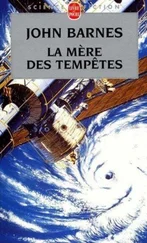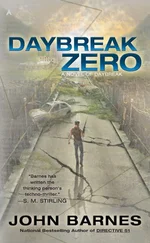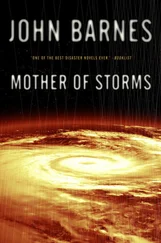Graham sighed. “I remember all this. Carol May Kloster’s column is what I read for dessert, after I digest the hard news stuff. I always enjoy her piece. May I ask, is this going anywhere?”
“Just getting there. You see, when Quattro and his DC-3 landed on the highway there, it demonstrated that I-64 near the village would make a good airfield. And with Pale Bluff as a center of operations, there’s real potential for getting control of the whole lower Ohio Valley.
“And what I hear from Carol May is that there are quiet little meetings going on, people in Pale Bluff who favor Athens, or favor Olympia, getting together with like-minded citizens. Right now they’re talking about putting together political parties for the elections in eighteen months. But you know, if the war starts… my guess is you each have an agent or two in those little clubs, and that in certain circumstances, you would tell that agent to start some trouble, between all those neighbors who have sweated and worked together all that time; oh, say, think maybe of two workmates that went through the whole hard winter arguing politics together… and now you’re putting it on course for one of them to murder the other. And maybe you should think about their daughters being best friends, too, you know? But then after a few murders and some burnings, and a few hearts broken forever, well, one of you would get control of Pale Bluff. And the first thing you would do, to make it defensible, is to clear the cover around that village. That would be those orchards, you know? Regrettable of course, good-bye apples, but you have to do what you have to do.
“So that was my story, and here’s my question. Exactly what can you gain in the war that would be worth a dozen or so murders and burnings in that little town, and cutting those orchards down, so that soldiers could come in and throw out the families and fortify the buildings? Cameron?”
“I see the point and it’s a well-taken idea—”
“No, I wasn’t looking for a review. Pale Bluff might be your key to controlling the lower Ohio Valley. Now just explain why you must control the lower Ohio Valley, eh? What’s it for?”
Cameron looked down at the table. “I suppose if I don’t answer it will look even worse.”
“I have no opinion on how it will look. I’ll probably write the story, and only the people in this room will see you. Though of course many of us are your old friends. I like to think all of us are, actually.”
Cameron Nguyen-Peters sighed. “All right. If we can gain the Ohio Valley this summer…” He shrugged. “All right, this is your point, of course, it doesn’t have much to do with apples or choirs or little girls who are friends.”
“It’s your call, Mr. Coordinator. But can’t you draw the line? Aren’t you willing to say that the benefits of a united country, when we’re getting ready to fight the war for our survival, are just too important—that yes, it’s sad that two kids can’t be friends anymore because one of their daddies knifed the other one for the greater good?”
“If we’re occupied and conquered—”
“Do you believe there’s a force remaining on Earth that can come to this country and do that, right now? But let me ask that hard question in an even harder way—those people in Pale Bluff—how much of their orchards, which is what they depend on for food and prosperity, and how many of the houses they’ve labored to make work in this new world without gas or electricity, and how much of the society they’ve constructed—how much of that should go down the toilet so that you can control the Ohio and parlay that into controlling the country?” Cameron started to answer, but Manckiewicz said, “Your question this time, Mr. Weisbrod.”
Weisbrod said, “It’s the old professor in me, or maybe Cameron is a better man than I. I can at least make myself say that as a matter of principle—as a matter of principle, I don’t like having to answer that question. But I can see why you asked it. Apparently my principles are no stronger than Cam’s; perhaps I am a better man than I thought.”
Heather could see Allie was about to pop with rage, and moved to sit beside her. I’ve arrested presidents in my day, clocking a First Lady would just be dessert. The silence wore on as the two leaders sized each other up with new eyes, neither quite willing to be the man who said, Yes, on my head be it.
“In some dumb book I read as a kid,” Chris said, “someone said that people who put principles before people are people who hate people. All right, another question: Did you happen to read Cassie Cartland’s piece about the re-opening of the schools in Pueblo, and the way everyone turned out to see high-school kids running footraces? Now, you probably have never heard this, but Pueblo is a city of heroes. More Medals of Honor earned per capita than any other city in American history; if there’s time tomorrow I could show you the monument, right across from where they had the finish line for the 10k. I have to say, you should have seen how seriously those kids run, how much it means to them to be in school, and that, you know, we think of ourselves as one of the places that is re-inventing civilization, and the honor of their school actually means something besides a fund-raising slogan. Cassie’s in that school herself, and so’s her boyfriend, by the way. Does either of you have a principle important enough to blow the legs off one of those boys, or blind one of those girls, or kill ten of them by turning them into a mess that they couldn’t be recognized by their mothers? You know—those women in the bleachers that Cassie was so funny and warm-hearted about? Got any principles so strong that you could justify having them all do that to each other?”
“Now, wait a minute,” Graham said, taking off his glasses in his favorite dramatic gesture. “This is the classic move of pitting ordinary private feelings of personal decency against serious and important ideas that apply to the general good of the world as a whole—”
Chris was emphatically shaking his head. “Which is made up, among other things, of kids and mothers. So if a few mothers lose a child or two—or send a kid off to war and get a murderer back—”
“That’s just what I mean, a killing in war is not murder—”
Chris looked up at him with the mildest of expressions, and said, “You know, Roger Pendano died in a firefight over principle, which, I seem to remember, was vitally important. And by that time he was an old broken man who really just wanted to die. And was it worth it to prevent Shaunsen from ruining the nation?”
Cameron started from his thoughts. “I—well, yes, I do think so. Pendano knew the risks, he was mature, he was ready to die… and we’re talking about the whole future of a great country…”
“Mr. President, you knew him well, he was your friend for thirty years. Was the country worth the cost of the man?”
“I’d say… yes. Yes it was.”
“Would it have been worth it when he was twenty-one?”
Weisbrod glared. “This is going to be a long two hours.”
“Coordinator Nguyen-Peters was brave enough to try and answer. Are you?”
“Oh, Christ on the cross, how many times do I have to look at some life or other, some kid eating ice cream or a father holding a baby or somebody putting a roof on his house and say, over and over, ‘Yes, I’d kill him for my ideals’? I get it. I understand what you are driving at. I might even concede,” Graham said, cleaning his glasses, “that, well, yes, all right. All the fuck right. You are right. It does not make me proud of myself to say, ‘This man has to lose his life, and his family has to go hungry, and that other family must be without the shelter of the house they worked like hell to put together, and both families’ sons must kill each other… and say that all that has to happen just so we can establish that the Succession Act of 1947 takes precedence over Presidential Directive 51. And it would suck to be that man’s little boy, and that killer’s brother. There. Yes, I said it—”
Читать дальше












